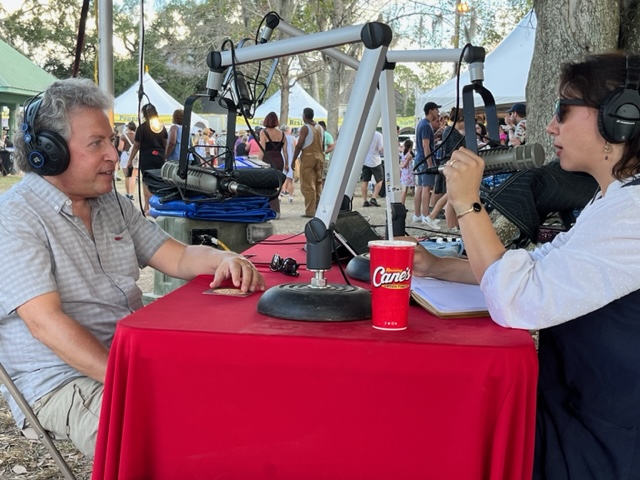
Photo credit: Cheryl Devall, KRVS.
Also known as Radio Acadie, the Lafayette, LA station plays pivotal role in showcasing the past, present, and future of a rich francophone heritage.
As you drive west along Interstate 10 in Louisiana, past New Orleans, you will find yourself over open water — swamps, rivers and basins — heading into a region known as Acadiana. The name refers to the Acadian people driven from Canadian territory after British military victories over France in the 18th Century. The southwestern corner of Louisiana is home to one of America’s most vibrant and diverse music scenes, easily rivaling the bigger, better-known port city to its east. At the heart of it lies KRVS, a Lafayette-based public radio station dedicated to celebrating the cultural heritage of the region, with a strong focus on francophone, especially Cajun and Creole, music.
KRVS began in 1963 as a 10-watt, student-run station at the campus now known as the University of Louisiana at Lafayette. Its growth in the early days coincided with a renaissance of interest in Cajun and Creole culture during the late sixties and into the seventies, bolstered by the creation of the Council for the Development of French in Louisiana (CODOFIL) in 1968. “Many of those masters [of Cajun and Creole music], I’d say most did not make a full-time living as musicians,” Cheryl Devall, the station’s general manager, explains of this earlier era. “There were next to no touring Cajun and Creole bands at that point […] So over that decade of the seventies when everybody was expressing pride in who they are, Cajun identity really solidified, as did Creole identity.”
One of the main attractions of KRVS is the way it supports and amplifies homegrown francophone music like Cajun and zydeco. Both arose in southwestern Louisiana from the Francophone folk music traditions of the Acadians, Creoles, enslaved Africans and free people of color. Both developed from common musical roots that relied on accordion, fiddle, and guitar. The triangle and washboard emerged over time as rhythm instruments. Song lyrics may be in French or English, or both. Megan Brown Constantin, the station’s marketing director and host of the archive-inspired program Encore, has studied the exceedingly long lineage of Southwest Louisiana music and performs that music in touring and local bands. “We still sing songs in Louisiana and play them on the radio that were sung in France easily 900 years ago.”
Today, the station has transformed into a powerhouse for francophone music, thanks in part to its partnership with CODOFIL. “It really wasn’t a cultural station until [they] got involved,” Constantin explains of the station’s evolution in the early eighties. “We had a mandate of a minimum 40 to 60 hours a week of French programming. Not just French music, actually hosted in the French language.” That partnership became the basis of a matching community grant and helped expand the station to where it is today, broadcasting across Acadiana 24/7 from a 100,000 watt transmitter.
KRVS offers a variety of programs that, beyond Cajun and zydeco, delve into regional alternative and rock, jazz, and classical performances. Devall later points out that the station — and the place it calls home — don’t fixate only on the past. “This is not a museum culture,” she reminds. The vibrant history of the area comes through in ways that express the wide variety of genres of the area, all while offering up a respect and freedom from cliche and tokenization. “Please don’t say the station is like a gumbo!” she jokes.
At KRVS, the hosts are deeply knowledgeable about all the music they play. Often they, like Constantin, are musicians themselves. That’s evident in programming that emphasizes the musical ties that bind Louisiana and other regions. “You get education along with the entertaining music, which is really unique and represents the diverse community that we have in this area,” she explains. “They make a lot of connections musically throughout the world and they can present those connections on air.”
This dedication to the community extends beyond music. KRVS also serves as a valuable resource for local nonprofits including cultural and social service organizations. Devall emphasizes the importance of this role, saying, “Our calendars of events are one of the places you can listen without having to go to every club’s Facebook page or site.” She emphasizes that KRVS includes in its local public affairs programs more and more organizations, offering exposure that few local media outlets can provide. “We can record interviews for 10 to 15 minutes that allow them a whole lot more time than any of the local TV stations do.”
In addition, KRVS supports Lafayette festivals with live broadcasts from Festival International de Louisiane, a five-day event that showcases francophone artists from around the world, and Festivals Acadiens et Creoles, three days that honor many facets of Cajun and Creole culture. Partnering with these events allows the station to be a megaphone for the unique arts and music scenes that have become an economic engine for its home state. Listeners from far beyond the primary broadcast area have become loyal audiences — and, sometimes, members — through the station’s digital stream and app.
Devall remembers how earlier in the pandemic, when she lived near Oakland, CA where she was a freelance story editor for documentary podcasts and long-form radio projects, the station she streamed on her laptop became a welcome companion. “I lived alone, worked alone, and was working all kinds of hours. And there was KRVS, and that was my reason to dance in the kitchen on Saturdays.” She moved to Lafayette to run the station in June 2022, largely because she knew and loved it. “I’ve thought recently about describing it with a phrase: ‘music that sounds like home.’”
Whether you’re from Acadiana, driving through and picking up KRVS on the dial, or streaming it online, the sound of the station will transport you to a part of the U.S. unlike any other.